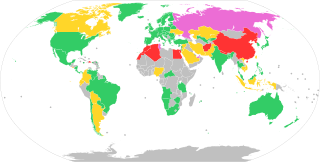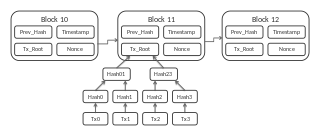 W
WBitcoin ATMs are kiosks that allows a person to purchase Bitcoin and other cryptocurrencies by using cash or debit card. Some Bitcoin ATMs offer bi-directional functionality enabling both the purchase of Bitcoin as well as the sale of Bitcoin for cash. In some cases, Bitcoin ATM providers require users to have an existing account to transact on the machine.
 W
WBitcoin is a cryptocurrency, a digital asset designed to work as a medium of exchange that uses cryptography to control its creation and management, rather than relying on central authorities. The history of bitcoin started with the invention and was implemented by the presumed pseudonymous Satoshi Nakamoto, who integrated many existing ideas from the cypherpunk community. Over the course of bitcoin's history, it has undergone rapid growth to become a significant currency both on- and offline. From the mid-2010s, some businesses began accepting bitcoin in addition to traditional currencies.
 W
WBitcoin Gold (BTG) is a cryptocurrency. It is a hard fork of Bitcoin, the open source cryptocurrency. It is an open source, decentralized digital currency without a central bank or intermediary that can be sent from user to user on the peer-to-peer Bitcoin Gold network.
 W
WOn June 9, 2021, the Legislative Assembly of El Salvador approved a bill for the adoption of Bitcoin with a majority vote of 62 of the 84 deputies in favor, making the Central American country the first nation in the world to adopt Bitcoin as legal tender. President of El Salvador Nayib Bukele explained that the new law would make it easier for Salvadorans living abroad to send remittances to their relatives in the country, an economic activity that accounts for around one-fifth of the nation's GDP.
 W
WThe Bitcoin Law was passed by the Legislative Assembly of El Salvador on 8 June 2021, giving the cryptocurrency bitcoin the status of legal tender within El Salvador after 7 September 2021. It was proposed by President Nayib Bukele. The text of the law states that "the purpose of this law is to regulate bitcoin as unrestricted legal tender with liberating power, unlimited in any transaction, and to any title that public or private natural or legal persons require carrying out".
 W
WThe bitcoin network is a peer-to-peer payment network that operates on a cryptographic protocol. Users send and receive bitcoins, the units of currency, by broadcasting digitally signed messages to the network using bitcoin cryptocurrency wallet software. Transactions are recorded into a distributed, replicated public database known as the blockchain, with consensus achieved by a proof-of-work system called mining. Satoshi Nakamoto, the designer of bitcoin, claimed that design and coding of bitcoin began in 2007. The project was released in 2009 as open source software.
 W
WA blockchain is a growing list of records, called blocks, that are linked together using cryptography. Each block contains a cryptographic hash of the previous block, a timestamp, and transaction data. The timestamp proves that the transaction data existed when the block was published in order to get into its hash. As blocks each contain information about the block previous to it, they form a chain, with each additional block reinforcing the ones before it. Therefore, blockchains are resistant to modification of their data because once recorded, the data in any given block cannot be altered retroactively without altering all subsequent blocks.
 W
WDeep Web is a 2015 documentary-film directed by Alex Winter, chronicling events surrounding Silk Road, bitcoin and politics of the dark web.
 W
WBitcoin is a cryptocurrency, a digital asset designed to work as a medium of exchange that uses cryptography to control its creation and management, rather than relying on central authorities. The history of bitcoin started with the invention and was implemented by the presumed pseudonymous Satoshi Nakamoto, who integrated many existing ideas from the cypherpunk community. Over the course of bitcoin's history, it has undergone rapid growth to become a significant currency both on- and offline. From the mid-2010s, some businesses began accepting bitcoin in addition to traditional currencies.
 W
WThe legal status of bitcoin varies substantially from state to state and is still undefined or changing in many of them. Whereas the majority of countries do not make the usage of bitcoin itself illegal, its status as money varies, with differing regulatory implications.
 W
WOpenTimestamps (OTS) is an open-source project that aims to provide a standard format for blockchain timestamping. With the advent of systems like Bitcoin, it is possible to create and verify proofs of existence of documents (timestamps) without relying on a trusted third party; this represents an enhancement in term of security, since it excludes the possibility of a malicious trusted third party to compromise the timestamp.
 W
WThe Bitcoin scalability problem refers to the limited capability of the Bitcoin network to handle large amounts of transaction data on its platform in a short span of time. It is related to the fact that records in the Bitcoin blockchain are limited in size and frequency.
 W
WZeroNet is a decentralized web-like network of peer-to-peer users, created by Tamas Kocsis in 2015. Programming for the network is based in Budapest, Hungary; is built in Python; and is fully open source. Instead of having an IP address, sites are identified by a public key. The private key allows the owner of a site to sign and publish changes, which propagate through the network. Sites can be accessed through an ordinary web browser when using the ZeroNet application, which acts as a local webhost for such pages. In addition to using bitcoin cryptography, ZeroNet uses trackers from the BitTorrent network to negotiate connections between peers. ZeroNet is not anonymous by default, but it supports routing traffic through the Tor network.